De Armeense dichter Yeghishe Charents werd geboren op 13 maart 1897 in Kars (toen Rusland, nu Turkije). Zie ook alle tags voor Yeghishe Charents op dit blog.
Requiem Aeternamin Memory of Komitas (Fragment)
Could your holy,
Broken soul ever dream that
You would return one day
To your great fatherland?
That such love and tenderness
Would scent your presence,
And Charents would kiss
Your lifeless lips?
But in your native land,
In its ancient mother-city,
On a new pedesral
And on purple hearts.
Your sacred body,
Embalmed as holy relic,
Has risen loftily,
Soaring like a mountain.
Here is your people,
Bringing its love and affection,
Rocking your fervent hart
mth your ancient songs
A heart, steeped in torment,
That has endured pain with such meekness
See how we sing to your glory now,
See how proud you’ve made us.
With a deep yearning, like a wound,
And a sacred awe,
I bow
To your dulcet bones.
From my heart and soul
Pours the same regret,
O my father, lost in a sleep without return,
That you could not see your son.
It seems as though I’ve seen you
From childhood till death.
As if I’ve wandered
Those deserted roads. 7
Holding your trembling hand,
For bread and water,
I’ve wandered like a thief,
With my blind beggar of a father.
Thus holding the aged hand
Of my harrowed father
I have begged, disconsolate, for bitter brand
In faraway places.
In the chill courtyards of churches,
Huddling with my sick father,
I have dreamt of our
Faraway home, like dreaming of bread.
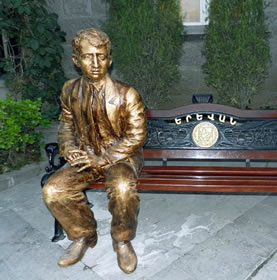
Yeghishe Charents (13 maart 1897 – 29 november 1937)
Standbeeld in Yerevan
De Duitse dichter Oskar Loerke werd geboren op 13 maart 1884 in Jungen. Zie ook alle tags voor Oskar Loerke op dit blog.
Der Stein ist hier zu End…
Der Stein ist hier zu End, hier treibt die grüne Kraft.
Du wünschst, dort stehe eine Steinlaterne,
Chinesisch, großer Meister zu gedenken,
Und nahe gegenüber ihrem Schaft
Ein niedrer Sitz zum Sichversenken.
Am Fuß ihm liegen Pfirsich-Purpurkerne,
Vom Fleisch entblößt, noch naß vom Saft.
Gehackt hat eine Amsel, ein Häher gescholten,
Dann gilt nicht mehr, was eben hat gegolten.
Nach unten siehst du Wüsten unter dem Rasen,
Nach oben Wüsten hinter den Wolkenoasen;
Wüsten endet ein Pflasterpfad und mündet
In einem Viereck aus schweren Platten.
Wo mag das sein? – Ein fremder Mann entzündet
Die heimische Laterne aus Basalt.
Wirklich ist er: er wirft einen Schatten.
Mein Schatten aber hat Baumes Gestalt,
Ich rage sausend über der Abendleuchte.
Der Mann im weiten Kittel aus schwarzer Seide
Erhebt das Auge, das verzückungfeuchte.
Von Weisheit voll und also leer von Leide,
Nimmt er den Wipfel, der über ihm weht,
Tief in sein Schweigen, bevor er geht.
Lautlos ging die Rosenuhr
Lautlos ging die Rosenuhr.
Rote Blätter lagen
Auf der Treppe vor dem Flur
Zu dem Haus der Sagen.
Auf den Stufen der Augur,
Knie um Knie geschlagen,
Schlief beim Gang der Rosenuhr –
Längst aus allen Tagen,
Längst schon ein Gerippe nur,
Los von Milz und Magen,
Unter grüner Stachelschnur –
Ohne daß der Himmelswagen
Aus dem Weltraum weiterfuhr.
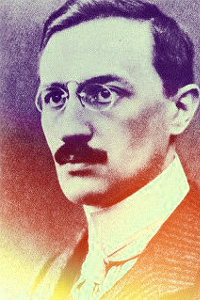
Oskar Loerke (13 maart 1884 – 24 februari 1941)
De Nederlands schrijfster Hermine de Graaf werd geboren in Winschoten op 13 maart 1951. Zie ook alle tags voor Hermine de Graaf op dit blog.
Uit: De weg naar het pompstation
“Ik kan hun gesprekken afluisteren en probeer de misdaad te reconstrueren. Mijn gedachten vormen een postmoderne misdaadgeschiedenis, waarin het lijk zelf de moord oplost. Dat ze me ooit iets zouden aandoen was een ingecalculeerd risico. Wee je gebeente als je niet doet wat de mensen zeggen.”
(…)
“Corinne was de knapste en het type dat er bij het ouder worden als een geconserveerde schoonheid goed blijft uitzien. Een fenomeen dat later door haar accountant, die haar als een diepte investering zag, feilloos op juiste waarde werd geschat.”
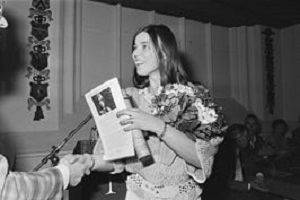
Hermine de Graaf (13 maart 1951 – 24 november 2013)
Hier bij de uitreikingvan de Geert Jan Lubberhuizen Prijs in 1985
De Canadese schrijver W.O. Mitchell werd geboren op 13 maart 1914 in Weyburn, Saskatchewan. Zie ook alle tags voor W. O. Mitchell op dit blog.
Uit: Who Has Seen the Wind
“Although two years of wind had filed the black dust even higher against the fences and farm buildings, and the yellow-stubbled fields were thinly stocked with the meagre stocks of lean times, the fall of 1931 still brought the excitement of harvest with it. The haize green of young wheat no longer spread over the flat expanse of prairie; the incessant winds rolled waves no longer through the darker green of June growth. For several weeks men had been busy in the fields. following the binders, stooping to pick up the sheaves and pile them into the stoolts that thimbled the land.
It was an urgent time of the year for the mu, whose livelihood depended upon the prairie. Down the streets on both sides of the river, tractors hauled threshing machines with feeders turned back upon themselves. linked to cool: cars and followed in turn by the wheeled half-cylinders of water wagons.
Empty and full. high, spreading grain wagons passed through on grinding wheels; long caterpillars of grain freights often blocked Main Street with their slow passage for minutes at a time.
Strange men swung down from the trains, their blanket rolls slung over one shoulder. bright flannel shirts open at the neck, their lean faces dark with coal dust. They stood before the beer parlour of the Royal Hotel, in front of Drew’s Pool Hall, or on the bank comer. waiting for the farmers who came into town, looking for bundle pitchers, spikers. and team Skinners. There was harvest work for perhaps half the men who came to the town, at a dollar and a half a day, the day lasting from five in the rooming to seven at night.
Though the crop was poor and wheat only twenty-five cents a bushel – it had cost thirty cents to grow – it must be harvested.
On the morning of the first day of September, the bright noise of sparrows just under the window high in the peaking front of the O’Connal house woke Brian.”
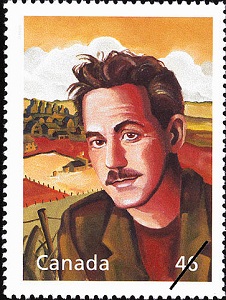
W.O. Mitchell (13 maart 1914 – 25 februari 1998)
De Britse schrijver Hugh Seymour Walpole werd geboren op 13 maart 1884 in Auckland, Nieuw Zeeland. Zie ook alle tags voor Hugh Walpole op dit blog.
Uit: The Young Enchanted
“Young Henry Trenchard, one fine afternoon in the Spring of 1920, had an amazing adventure.
He was standing at the edge of Piccadilly Circus, just in front of Swan and Edgar’s where the omnibuses stopped. They now stop there no longer but take a last frenzied leap around the corner into Regent Street, greatly to the disappointment of many people who still linger at the old spot and have a vague sense all the rest of the day of having been cheated by the omnibus companies.
Henry generally paused there before crossing the Circus, partly because he was short-sighted and partly because he never became tired of the spectacle of life and excitement that Piccadilly Circus offered to him. His pince-nez, that never properly fitted his nose, always covered one eye more than the other and gave the interested spectator a dramatic sense of suspense because they seemed to be eternally at the crisis of falling to the ground, there to be smashed into a hundred pieces, these pince-nez coloured his whole life. Had he worn spectacles — large, round, moon-shaped ones as he should have done — he would have seen life steadily and seen it whole, but a kind of rather pathetic vanity — although he was not really vain — prevented him from buying spectacles.
The ill-balancing of these pince-nez is at the back of all those adventures of his that this book is going to record.
(…)
““God! Is there a God, do you think, Henry?”
“Yes,” he answered. “I think there is One, but of what kind He is I don’t know.”
“There must be… There must be… To go out like this when one’s heart and soul are at their strongest. And He is loving, I can’t but fancy. He smiles, perhaps, at the importance we give to death and pain. So short a time it must seem to Him that we are here… But if He isn’t… If there is nothing more- What a cruel, cold game for Something to play with us-“
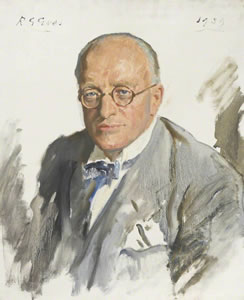
Hugh Walpole (13 maart 1884 – 1 juni 1941)
Portret door Reginald Grenville Eves, 1939
Zie voor nog meer schrijvers van de 13e maart ook mijn vorige blog van vandaag.
